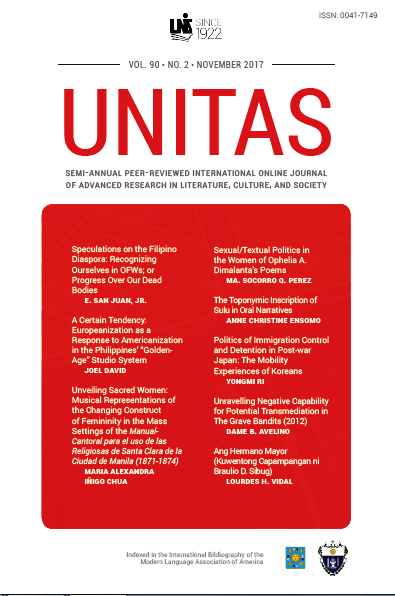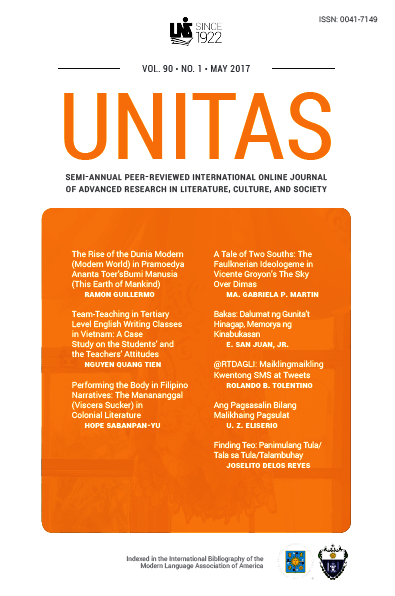UNITAS Journal
JOURNAL VOLUMES
As the oldest university-based multidisciplinary journal of its kind in the Philippines and possibly in Asia, UNITAS is a rich source of information and insights in understanding various aspects of the history of knowledge production in the Philippines across the disciplines. Established in 1922, UNITAS will celebrate its centenary in 2022, so a look into the rich history of the journal itself has been made possible by the UST Heritage Library Collections which has painstakingly scanned all copies of UNITAS starting from its very first issue published in July 1922. This was done for the preservation and digitalization of the journals and for the convenient perusal of specialists, scholars, and general readers. To view all the issues of UNITAS starting 1922, click here.
To find issues from volume 82 (2009) onwards, please type the volume number in the slot below and click on “SEARCH.” The current issue of UNITAS is available on this page.
Vol 90 No 2 – Sexual/Textual Politics in the Women of Ophelia A. Dimalanta’s Poems
The study attempts to show that while Ophelia A. Dimalanta’s excellent New Critical training and education have rendered her a quintessential poet conscious of form, technique, and craftsmanship, which in turn, has been foregrounded by her equally New Critical-trained colleagues, this New Critical tradition has limited the study of her oeuvre to artistic structure and form, glossing over myriad concerns that the poems may have
Vol 90 No 2 – The Toponymic Inscription of Sulu in Oral Narratives
In this paper, the tropological construction of Sulu—coded in the category “lupah sug,” meaning “land and current”—will be analyzed and elaborated, with the intent of contributing to incipient discourse on the kapuluan. Framing Sulu in this way would prove generative to the extent that it decenters primordial assumptions regarding territoriality, which are often land-based, to foreground a sociality which has as its ontogenetic principles movement, migration, and dispersion.
Vol 90 No 2 – Politics of Immigration Control and Detention in Post-war Japan The Mobility Experiences of Koreans
This paper examines the institutionalization of the post-war Japanese border control system through an analysis of the international origins of the Ōmura Detention Camp (hereafter “the Ōmura Camp”)1, which was established in Japan under the Allied Occupation. In its origin, the Ōmura Camp was aimed not for confining people who committed illegal entry but just for offering a temporal waiting station for newly arrived immigrants.
Vol 90 No 2 – Unravelling Negative Capability for Potential Transmediation in The Grave Bandits (2012)
In the era of media convergence, the emphasis of aesthetics alongside economics has affected the manner of production in entertainment businesses. Because of this, new and improved forms of entertainment have emerged, one of them being the practice of transmedia. Transmedia is the technique of distributing media content across multiple platforms, whether narrative or otherwise.
Vol 90 No 2 – Ang Hermano Mayor Kuwentong Capampangan ni Braulio D. Sibug
Masayang-masaya ang aking Tiyo Cosme sa pag-uwi niya galing sa pulong para sa pista ng baryo namin. Para siyang nakaangat sa lupa. Nginingitian ang bawat madaanan niyang kabaryo at ikinakaway ang kanang kamay. Kasama niya ang mga nagtaguyod sa kanya sa kandidatura bilang hermano mayor. Sumisigaw sila’t nagbibiba sa tagumpay ng aking tiyo. Sa ganito nilang masayang paglakad, maraming sumunod sa kanila, pati na ang mga duling, bungi, bingi at ang mga naraanang naglalarong bata na nakisalo sa sigla’t ingay. Lahat sila’y parang mga talangkang nagsulputan sa tag-ulan. Napatangan ang Tiya Culasa nang makita niya na maraming taong patungo sa tirahan nila. Ano kaya ang nangyari? naisip niya
Vol 90 No 1 – Complete Issue
This issue inaugurates UNITAS as an open-access online scholarly journal after almost a hundred years of existence since its establishment in 1922. While committed to the double-blind peer review protocols in compliance with international standards of quality in academic publishing, UNITAS is now freely available for online reading, downloading, printing or distribution, cognizant of the principle of fair use in the hope of balancing the need for copyright protection and open content.


